Good morning, friends,
You might wonder why we’re leading off with a basic meeting in Quemado instead of the fresh admission from Border Patrol that they lack control over the border. While the latter would seem to be a bigger deal— let’s be real. If you’re reading this newsletter, odds are you don’t need us to tell you that the border is a raging dumpster fire, and high-level figures at the Department of Homeland Security and the White House have been lying their asses off about what a great job they’ve been doing.
So, Quemado. Turns out we were righter than we could’ve expected in our last newsletter. A big component of the informational meeting in Quemado was centered around the landowner affidavits that help enable trespassing prosecutions.
Quemado, by the way, is Spanish for burned or scorched. We’d never have guessed it. The village sits in a bit of a valley, nestled between Eagle Pass and Del Rio— and is one of the better spots around here for growing crops. It’s just plain greener, even supporting a pecan orchard among other things.
What caught us off guard was how many of the folks attending the meeting were unaware of the need for landowner affidavits.
In general terms, when someone is on a ranch and they call DPS or local Sheriff’s deputies for assistance, trespassing charges can and will be filed if anyone is arrested.
That happens with or without an affidavit.
Where affidavits come into their own, is when dealing with an absentee landowner situation, or when law-enforcement is conducting an investigation that leads them to think they might intercept a gang of trespassers coming through.
A landowner or a duly authorized representative like a ranch manager or foreman fills out the paperwork. Some have not wanted to do so in the past, saying they don’t want to get wrapped up in having to come to town and participate in court cases.
Fair enough— but if so, you can’t really complain about trespassers on your property. Given the imperfect nature of Operation Lone Star, and imperfect efforts by the state and local counties to stand in the gap left by federal policies right now, this is kind of the only thing resembling a solution, and it requires a certain amount of sacrifice.
For what it’s worth— Border Prosecution Unit attorney Nelson Barnes noted for questioners that so far, there’s only been one case where a landowner or a representative had to attend a trial. Barnes would know— he’s helping to cover a territory that runs almost the entire stretch of the river, or close enough to it as to make no real difference.
As we mentioned, many of the landowners seemed unaware of the need for the affidavits. In Kinney County’s case, we know there was a concerted effort on the part of the Sheriff’s Office early on, to reach out to every landowner in the County and get them to put an affidavit on file, facilitating investigations, arrests and trials.
From the tone of things, it sounds like similar efforts still have to be made elsewhere along the border by local governments, particularly Val Verde County. On the upside, that kind of an effort is almost as big of a declaration as an upset election. It takes a lot of work to accomplish and is very hard to argue with. If you get a bunch of landowners to sign such affidavits, it’s a clear signal that people are fed up and enough is enough— more so than any casual and easy posting on social media.
The hard part is getting the ball rolling. If you happen to live in a county that is participating in Operation Lone Star, probably the best thing to do is contact your local DPS troopers, or your local Sheriff’s Office and tell them you want to fill out an “affidavit for trespassing prosecutions.”
If you’re in a county that hasn’t quite come that far along yet and the person answering the phone at your local Sheriff’s Office doesn’t know what you’re talking about, keep pushing the matter with DPS— local troopers and liaisons are clearly aware of the need, and it shouldn’t be long before someone makes arrangements to get your John Hancock.
What are some downsides to filling out such an affidavit? That was one of the questions asked, and while most law enforcement would hasten to say, “There is none,” a creative thinker can probably imagine a few. It’s up to landowners to decide for themselves if it’s worth it to them or not. While DPS and local Sheriff’s deputies are obliged to contact you when and if they’re coming out to plant cameras or what-have-you, there’s always the chance of wires getting crossed and law enforcement showing up and being present at a time that’s inconvenient or downright awkward.
Well, for folks who literally have had hundreds of people on their property, knocking on windows and banging on doors, the matter is probably a no-brainer. What’s the inconvenience of a few men carrying badges, compared to the inconvenience of one’s pastures being used as a superhighway? Not much, one imagines.
What else jumped out at us about the meeting?
Well, it’s clear that old dogs are having to learn new tricks. For as long as we can remember, the Department of Public Safety has been a rather opaque organization, with members usually at something of an arm’s length from the general population. And, as long as we can remember, the organization has been a little difficult to communicate with.
Just look at what the average citizen goes through when trying to get a concealed carry license— or sorting out the acquisition of a Commercial Driver’s License. In both cases, one would send the paperwork off to Austin, it would disappear into a black hole, and some time— a long time later in some cases— you’d get something back.
Have a question? There might be a phone number or an email address, but one was always left with the feeling of being discouraged from using them. And let’s not even talk about visiting the DMV in a major metro.
Now, DPS is in a position of having to deploy a “charm offensive,” of sorts— having to discover new best practices for getting the word out to ranchers and private citizens in far flung and sparsely populated communities and embrace what seems to us to be a more open posture than in the past.
Kinney County Sheriff Brad Coe testified before various Congressmen down in Pharr/McAllen Wednesday, along with the Chief of the U.S. Border Patrol, Raul Ortiz, who came out and admitted that the U.S. Government does *not* have control of the border.
The statement is probably no surprise to most of our audience, but as we’re constantly reminding ourselves, many folks around the country are still asleep on the issue, still too busy with the distractions of their own lives and the soporifics of professional sports, comic book movies, and the playground tit-for-tat that passes for political discourse.
Congressional Democrats boycotted attending, trying to paint it as a partisan event, or perhaps just trying to avoid getting a bunch of egg on their faces given the fact that the White House has been trying to insist that things are under control when they clearly haven’t been for a long time.
Here’s a semi-decent report on the event, by News Nation. Most other mainstream press stayed away. Here’s Bethany Blankley’s reporting for the Center Square, which apparently was picked up by the Washington Examiner. That’s kind of rad, for her. We linked to News Nation first, because we’re about to link to another article by Ms. Blankley and it’s starting to look like the Ms. Blankley show around here. Nothing wrong with that, but one does want to seem as though they’re consuming news from a wide variety of sources.
Why did most national press stay away? Presumably, they bought into claims that the event was being politicized and assumed there’d be little fresh news value. Oops. Chief Ortiz’s statement is pretty dang newsworthy, frankly.
Anyway— Ms. Blankley also filed an in-depth piece focusing on Sheriff Coe’s testimony, as always, we have a snippet here:
(The Center Square) – Kinney County, Texas, Sheriff Brad Coe told members of Congress on Wednesday his small rural county of less than 3,200 people “was under siege” by illegal foreign nationals “being smuggled through the county on back roads that circumvent U.S. Border Patrol checkpoints.”
Coe said he was “fighting so hard, so I don’t lose the county.”
A former Border Patrol agent of 30 years before he was elected sheriff, Coe testified before the U.S. House Committee on Homeland Security at a field hearing on border security held in Pharr, Texas.
Kinney County was the first county to declare an invasion in Texas on July 5, 2022. It shares 16 miles of border with Mexico and spans roughly 1,370 square miles.
—Reporter Bethany Blankley, The Center Square
Here’s a link to video of the whole hearing on youtube, provided by Reuters.
The Sheriff’s testimony comes at about 2-hours in.
And finally— who doesn’t love a bright red Corvette?
This beautiful thing was involved in a smuggling attempt in Kinney County this week. The driver and an accomplice in another vehicle were observed picking up illegal aliens late Wednesday night, inside the Brackettville City limits.
They then headed out onto the highway, with the Corvette attempting to get the attention of and decoy away Deputies and Troopers. Maybe someone used the phrase “ticket-me-red” around these guys and they took it seriously.
Here’s the other car: A nice, anonymous Ford Fusion.
The whole wagon-train was pulled over on RR 334, a route frequently used to try and bypass Border Patrol checkpoints on Highway 90.
It was a small load— only three illegal aliens inside the Ford.
One thing we’ve heard from law-enforcement is that when not bailing out, many illegal immigrants will stay in place in the back seat or wherever they’re at, until they’re told to come out. Sometimes it’s referred to as playing possum. We personally assume it’s a matter of them being accustomed to doing what they’re told, after being ordered about by the cartels, and also wanting to avoid any possible rough treatment by law enforcement.
And finally, here’s a look at the suspects— a couple of San Antonio area characters. We’re not sure which one is which, but the names we have for them are Jesse Alvarez III, of Floresville and Nestor Adorno Salgado of San Antonio.
Good night, Nestor. Good night, Jesse.
And a great morning to you, wherever you are and however you happen to be reading this.
We’ll be back again sometime soon. Among other things, we’ll be trying to update the story of Tara Lee Rodas. If you don’t remember the name, she’s the whistleblower that’s blowing up Health and Human Services, saying that the Government is all-but knowingly turning over unaccompanied minor migrant children to sex traffickers in Houston, Austin, and other cities.
Until then, keep those chins up. One last thing that jumped out at us from the meeting in Quemado: Kinney County Judge John Paul Schuster addressed the audience briefly at the end— telling folks to make sure and reach out to their own network of friends and relatives around the state and country— to stress to them that what is happening here is real, and what they’re seeing and hearing on the news is just the tip of the iceberg in many cases.
He’s right, it is going to take a widespread grassroots effort to overcome attempts to minimize or gloss over what’s happening, and it all begins with telling a friend. And while this has been going on for 2-3 years already, it seems we’ll be in it for a longer haul. So. Limber up. Put your back into it. Tell two friends. Or three.
As always, this newsletter is a solo effort and any mistakes, errors, or misdeeds are ours alone. Despite our employment with Kinney County, it should not be mistaken for any kind of official communication on behalf of the County. Indeed, it is produced without any input or oversight by County leaders and predates our hiring.
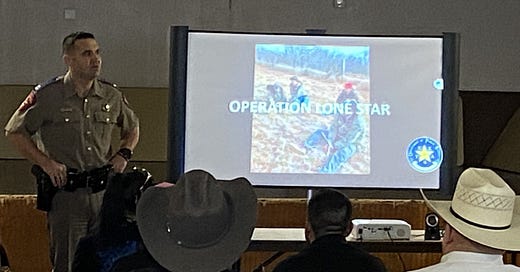



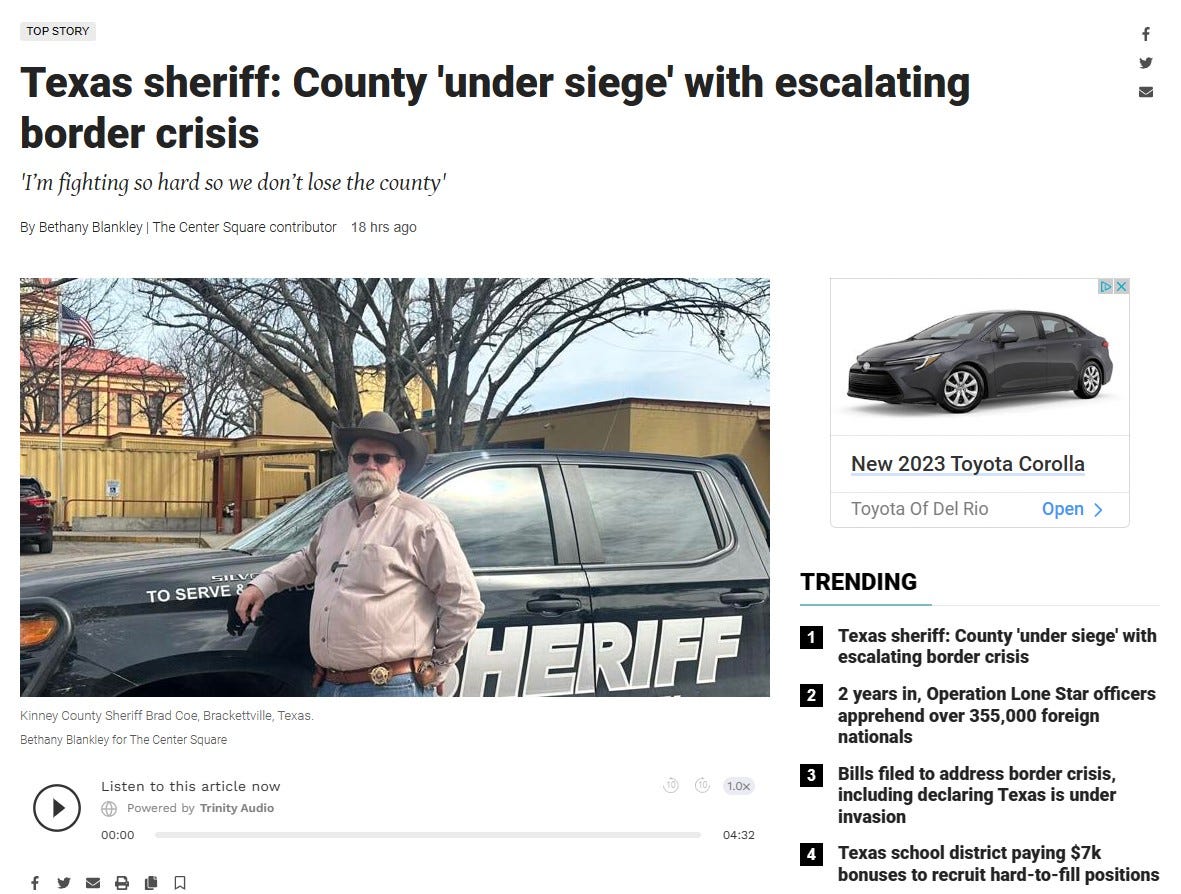

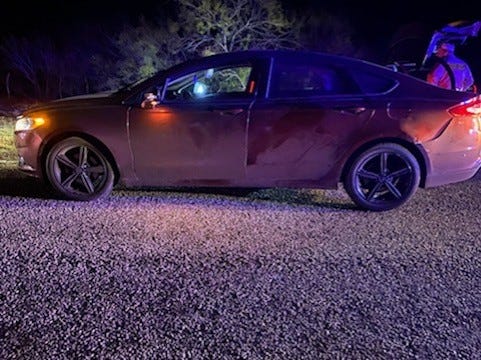
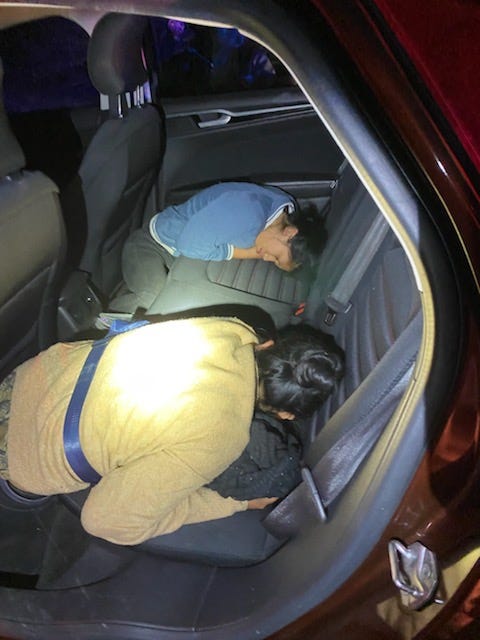
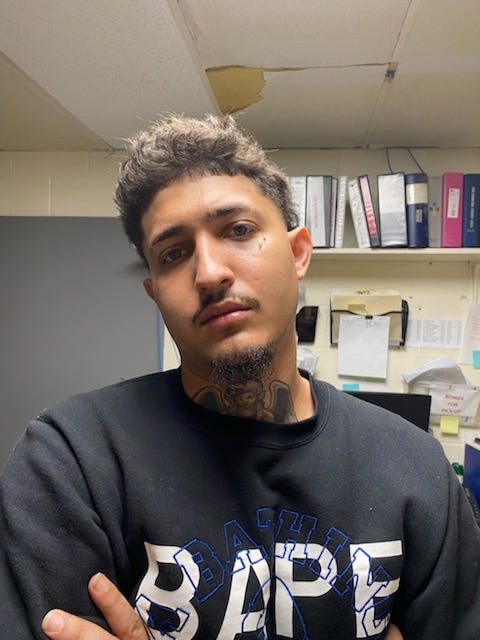
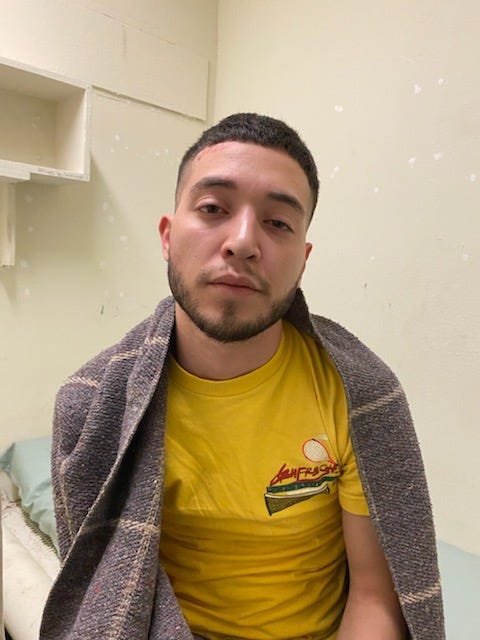
Well, I do pass this on to a select few. On another note...soporifics = a drug or other agent that induces sleep. Word of the day is much appreciated.